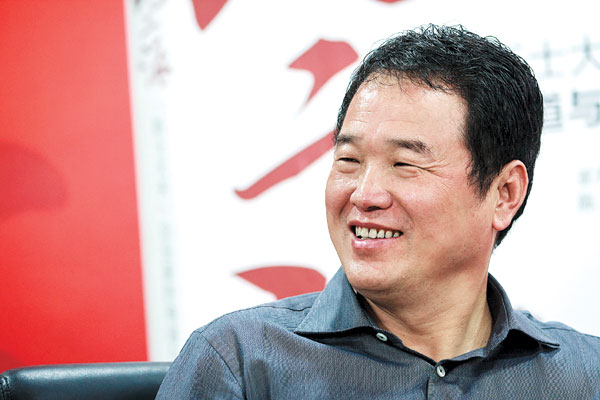
 'Taken 2' grabs movie box office crown
'Taken 2' grabs movie box office crown
 Rihanna's 'Diamonds' tops UK pop chart
Rihanna's 'Diamonds' tops UK pop chart
 Fans get look at vintage Rolling Stones
Fans get look at vintage Rolling Stones
 Celebrities attend Power of Women event
Celebrities attend Power of Women event
 Ang Lee breaks 'every rule' to make unlikely new Life of Pi film
Ang Lee breaks 'every rule' to make unlikely new Life of Pi film
 Rihanna almost thrown out of nightclub
Rihanna almost thrown out of nightclub
 'Dark Knight' wins weekend box office
'Dark Knight' wins weekend box office
 'Total Recall' stars gather in Beverly Hills
'Total Recall' stars gather in Beverly Hills
Rhythm of life
Updated: 2012-11-20 09:52
By Mei Jia (China Daily)
|
||||||||
 |
|
Entrepreneur Huang Nubo has published a number of poem collections, and the latest is Luo Ying's Poems. Provided to China Daily |
As he waits to sign on the dotted line of his Icelandic deal, Chinese entrepreneur Huang Nubo has published a collection of poems about life. Mei Jia reports.
Beijing Zhongkun Investment Group Chairman Huang Nubo made headlines recently about his eagerness to rent a plot of land in Iceland. But the billionaire is also well-known as a poet. While waiting for his Icelandic deal to be finalized, he has channeled his energy into writing and publishing.
Related: No match for progress
Going under the pen name Luo Ying, the fruits of his creativity are in his latest collection, Luo Ying's Poems, published by People's Literature Press.
The anthology contains two groups of poems that are sharply different in style and images: One looks at youth in a humorously realistic manner, while the other goes into philosophical observations about the micro world, such as sand and bugs.
"It's not an easy time for privately owned business. I've had my pains in running my company," Huang says.
"But I find comfort in going back to the past and to the places I feel nostalgic about. No matter how my poems are viewed, I keep writing," he says.
The collection has poems created from 2008 to 2012. Huang chronicles every poem with the time, date and place of creation (half are on planes during his travels), offering "a rare chance to peek into the secret life of a poet at work", as poet and critic Hu Xudong says.
The first part of the collection, a group of 41 poems under the title The Diary of the Educated Youth is dedicated to years when he moved from the city to join the labor force in the countryside of Ningxia Hui autonomous region, during the "cultural revolution" (1966-76).
To translator Denis Mair, the generation of educated youths in China is the Chinese version of The Beat Generation.
But Mair says, from Huang's poems, he can also feel the vitality of the generation.
In Huang's poems, readers will be able to visualize the younger version of the successful businessman. In a poem titled Huang the Accountant, the 56-year-old entrepreneur describes his intellectualism with the metaphor of having a pen in his pocket, and he was cynical about his status as a village accountant.
Huang also pictured - in direct or one can even call "ruthless" language - the life, death, sex and love of educated youths in the countryside and the lives of rural people.
Writer Deng Xian believes Huang records the youth of anonymous young people who were engulfed by the tide of history, and gives an account of their precious memories that have become a constant inspiration for contemporary Chinese literature.
"I know Huang is writing about true experiences. I brought back the poems to our old friends. They like them," says Zhang Binghe, one of Huang's old friends from Ningxia.
Although critics say they cannot find an exact term for Huang's poetic language in The Diary of the Educated Youth, they say it is something in between the Ningxia folk ballad and rap, and they believe his poems extend the narrative tradition of Chinese ancient poetry.
The second half of his collection, 60 poems under the title of Aqua and Fairy, balances the first with scholarly wording and abstract images, showing another side of the poet as a philosophical thinker about life and nature.
Since the 1980s, Huang has published poetry collections 7+2 Mountain Climbing Diaries, The Ninth Nights and Little Rabbit - each explores different literary approaches and style.
Besides writing, Huang also recently sponsored a poem-reading season launched by China National Radio, to go with the national Xia Qing Cup Contest of Reading Aloud Performances.
Huang hopes the contest will revive public enthusiasm in poetry.
To broadcasting majors, Jia Yi-chun and Leng Xue from Communication University of China, witnessing veteran artists narrating the poems - both ancient and contemporary - brings an inspiring excitement about the beauty of language and performing.
"Performing the poems is an art itself. With tones, pauses and speed, the performer recreates the poetry and conveys his own understanding to the audience," veteran broadcaster Cao Can says.
Wang Jing, judge of the Xia Qing Cup from China National Radio, says she was touched by Huang's poems.
"I cried when I read Huang's new poems," Wang says. "I hope his poems infuse new blood into the performers' tank of reading sources."
Contact the writer at meijia@chinadaily.com.cn.
Most Viewed
Editor's Picks

|

|

|

|

|

|
Today's Top News
Health new priority for quake zone
Xi meets US top military officer
Japan's boats driven out of Diaoyu
China mulls online shopping legislation
Bird flu death toll rises to 22
Putin appoints new ambassador to China
Japanese ships blocked from Diaoyu Islands
Inspired by Guan, more Chinese pick up golf
US Weekly

|

|






